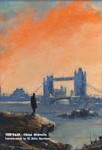The Tain - China Mieville
Reviewed for Usenet (or see Google
archive).
The Tain
China Mieville
Novella (88 pages)
PS Publishing
ISBN: 1902880641

I've been saving this novella for a treat; it's a limited print run, signed by the author and numbered. Introduction by M. John Harrison, signed by him too. I like PS Publishing's output; they're a bit indulgent, but both the fiction and the physical product are great.
The Tain isn't really the typical Mieville, reading more like the urban bleakness of his first novel, King Rat, than his later, lusher novels Perdido Street Station or The Scar.
It's great - the story at first glance seems like yet-another-survivor-in-post-apocalypse-London, but as things go on we see that the story (warning: pretty mild spoilers) is based around a fragment from Borges The Book of Imaginary Beings, and deals with mirrors, and what lies behind them.
The story is written in alternating chapters, with our hero in the real world narrating one thread, while in the other his mirror image narrates his, compellingly symmetrical, experiences. I don't want to say to much about the story, simply because this novella is really about the story-telling. And what an ending.
I'll throw in a quick snippet of the start; it sounds bleak. It is bleak. It's also compelling and enjoyable reading which grows on you slowly and gains depth and meaning as the narrator tells us more.
The light was hard. It seemed to flatten the walls of London, to push down onto the pavement with real weight.
It was oppressive: it scoured colours of depth.
[...]
The puddle was directly below his face, and it was blank, as he had known it would be.
He looked closer, until he could see faint patterns. A veil, the ghosts of colours and shapes moved across the thin skin of water: incomprehensible but not random, according to strange vagaries.
The man stood and walked away. Behind him the sunlight hit the Thames. It did not scatter: it did not refract on the moving river into little stabs of light. It did other things.
(The surfeit of colons in that snippet is a fluke, and no representative of the majority of the prose.)
Highly recommended.
(Even for people who found the Dickensian squalor of Perdido Street Station too much to stomach. This is much leaner and less squalid.)
Look for Cities, edited by Peter Crowther, Gollancz SF, for a mass-market bundling of this novella, and three other excellent ones, in an accessible mass market version.
The Tain
China Mieville
Novella (88 pages)
PS Publishing
ISBN: 1902880641

I've been saving this novella for a treat; it's a limited print run, signed by the author and numbered. Introduction by M. John Harrison, signed by him too. I like PS Publishing's output; they're a bit indulgent, but both the fiction and the physical product are great.
The Tain isn't really the typical Mieville, reading more like the urban bleakness of his first novel, King Rat, than his later, lusher novels Perdido Street Station or The Scar.
It's great - the story at first glance seems like yet-another-survivor-in-post-apocalypse-London, but as things go on we see that the story (warning: pretty mild spoilers) is based around a fragment from Borges The Book of Imaginary Beings, and deals with mirrors, and what lies behind them.
The story is written in alternating chapters, with our hero in the real world narrating one thread, while in the other his mirror image narrates his, compellingly symmetrical, experiences. I don't want to say to much about the story, simply because this novella is really about the story-telling. And what an ending.
I'll throw in a quick snippet of the start; it sounds bleak. It is bleak. It's also compelling and enjoyable reading which grows on you slowly and gains depth and meaning as the narrator tells us more.
The light was hard. It seemed to flatten the walls of London, to push down onto the pavement with real weight.
It was oppressive: it scoured colours of depth.
[...]
The puddle was directly below his face, and it was blank, as he had known it would be.
He looked closer, until he could see faint patterns. A veil, the ghosts of colours and shapes moved across the thin skin of water: incomprehensible but not random, according to strange vagaries.
The man stood and walked away. Behind him the sunlight hit the Thames. It did not scatter: it did not refract on the moving river into little stabs of light. It did other things.
(The surfeit of colons in that snippet is a fluke, and no representative of the majority of the prose.)
Highly recommended.
(Even for people who found the Dickensian squalor of Perdido Street Station too much to stomach. This is much leaner and less squalid.)
Look for Cities, edited by Peter Crowther, Gollancz SF, for a mass-market bundling of this novella, and three other excellent ones, in an accessible mass market version.
Posted: Wed - April 9, 2003 at 07:46 PM
Quick Links
Calendar
| Sun | Mon | Tue | Wed | Thu | Fri | Sat |
Categories
Archives
XML/RSS Feed
Search
Statistics
Total entries in this blog:
Total entries in this category: 129
Published On: Jun 06, 2004 12:00 AM
Total entries in this category: 129
Published On: Jun 06, 2004 12:00 AM